Fair Trade Coffee Brands
What are fair trade products? And, what Fair Trade Coffee Brands should I support?
If you believe that Fair Trade is just a new catch phrase that allows corporations a chance to raise prices and gut your wallet, think again.
There are many fair trade products around the world. Coffee is among the leader with regard to free trade. Fair trade coffee brands laugh in the face of Big Ag.
Do You Want the BEST Fair Trace Coffee Brand?
The practices of fair trade are the lifeline for many poor farming communities and a guarantee that eco savvy, sustainable methods are being employed to get the best possible cup of java in your hand every morning.
Fair Trade Certification
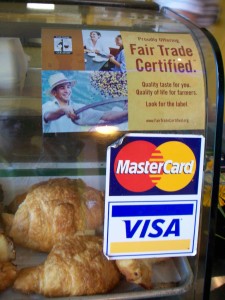
“fair trade certified” by kafka4prez, Flickr (CC BY-SA 2.0)
Certified Fair trade products are making an appearance on store shelves all around the world. You know it’s a good thing, but maybe you’re not really sure why.
What does it mean when something is fair trade certified? What goes into that certification?
And more importantly, what does that certification mean to me?
Fair trade products such as coffee start their existence on small rural farms all over the world. But, mostly in areas of economic distress.
Small fair trade coffee farms find themselves competing with Big Ag plantations for the money they need to survive.
Band Together To Fight Big Ag
These farmers band together, form a co-op and trade directly with the companies that will use their products.
Also, being fair trade certified guarantees them a fair price for their coffee beans and their coffee brands.
The fair trade coffee brands prices allow them to indulge in such luxuries as medical care and education.
The other side of certification is the agreement the farmers make to use sustainable farming techniques that protect the environment.
As for the health savvy consumers, the fact that this agreement includes the exclusion of harmful agrochemicals, as well as any GMO (Genetically Modified Organism) crops, making fair trade coffee a fairly attractive alternative.
The Promise of Fair Trade Coffee
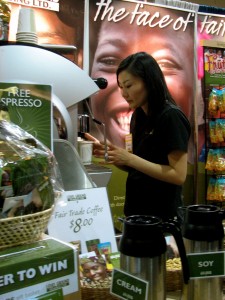
“fair trade coffee” by Dave O, flickr (CC BY-SA 2.0)
Like I said earlier, putting fair trade certified products on your coffee bean menu is like keeping a promise you may not even realize that you want to make.
The families that grow that coffee and the organizations that make fair trade possible are promising you their absolute best.
When you buy fair trade coffee, you’re saying, Yes to good business practices, fair living and working conditions, and Yes that you care about the environment.
A Fair Price
The promise of a fair price does not mean that you will get a bargain on your next latte.
It means that the companies who employ your favorite baristas are paying the farm families that provide the beans a fair price for their efforts.
Farmers who deal fair trade coffee are guaranteed a certain monetary amount. Right now that stands at $1.40 per pound.
That price increases if the coffee is also certified organic. An additional social premium is paid and organizations and co-ops can obtain a pre-harvest credit if they fall into hard times.
Fair Labor Conditions
Workers in coffee plantations suffer from some of the worst living conditions in the world.
When an organization abides by the rules of fair trade, the farm workers are guaranteed general freedoms, such as the freedom of association; they are also guaranteed safe working conditions and decent living wages.
Fair trade organizations are forbidden to use forced child labor. It is sad that this should be an issue, but it is all the same.
Indentured workers and child slavery is a horror and a reality on many large coffee plantations around the world.
This single promise, the promise of freedom for the workers is reason enough for the liberty minded people of the free world to choose fair trade coffee brands over cheap coffee any day.
Direct Trade Done Fairly
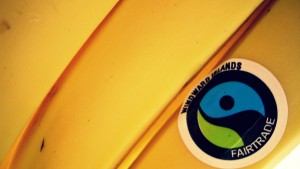
“Fair Trade” by lilivanili, flickr (CC BY 2.0)
Another great accomplishment of fair trade coffee brands are the organization of direct agreements between the farm co-ops and the company that wants to use their beans.
By cutting out the middle man, companies such as Starbucks and Aldi’s can offer the growers great prices, while they protect their customer’s interests.
Fair Organization
As a person who bleeds red, white and blue, it’s hard for me to stomach how important it is to protect the rights of the farming communities to organize. It seems like such a no brainer, and it is such a small concession.
Yet, when a co-op agrees to get fair trade certified, they agree to democracy. The farmers and the workers get a say in how the money they receive, as a social premium, is spent.
Fair Community Involvement
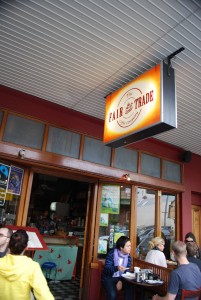
“Fair Trade Cafe Company, Glebe” by Alpha, flickr (CC BY-SA 2.0)
Often, along with that social premium, a small percentage of sales of fair trade coffee brands goes directly into community development.
The men and women who make up the co-ops agree what programs brought to these communities.
These community-minded programs come in the form of training and scholarships, community improvements, such as clinics, and social services.
There’s also the further certifications which may raise revenues, such as organic certifications.
In some instances, communities use these funds as a buffer for when an unseen disaster strikes and food, clean water and building repairs are necessary.
Fairly Sustainable Practices
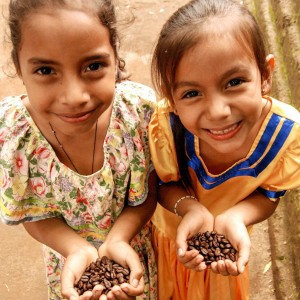
“FMSC MarketPlace – Fabretto Coffee” by Feed My Starving Children, flickr (CC BY 2.0)
Using sustainable methods does more than appease the hippies and eco-enthusiasts, (although it makes them really happy too). The sustainable farming practices help the farmers as well.
The lack of sustainable farming practices is how we wound up with the dust bowls of the 1930’s.
No crop rotations and inadequate fertilizing simply stripped the land so nothing would grow. When there were no roots to hold the dust down, it then gathered in great clouds and rampaged across this country.
There is every reason to believe that harmful agrochemicals, as well as GMO crops, pose as great a risk to the environment.
For years, researchers have been warning that GMO’s are directly responsible for the decline in the bee population. We all know, it takes bees to pollinate the plants.
That being said, if the bees go, then how long will it be before we all go? Farmers who practice fair trade are simply saying No to the killing of their land; a land in which their children will someday inherit.
Best Fair Trade Coffee Brands
Now that we’ve discussed some of the Pros and Cons of buying Fair Trade Coffee Brands, there is some more good news.
Some of the best coffee beans we’ve ever found are Fair Trade coffee brands.
So, not only can you use your wallet to cast your vote for how coffee bean farmers are treated, you will be getting back a great return for your investment. And, after having slept well the night before, you can drink your morning cup of fair trade coffee knowing that you are doing your part to make this a better world.
Here is the list of truly fantastic fair trade coffee brands that we found while researching this article.
Valhalla Java Whole Bean Coffee

[wpi_designer_button text='VALUE VALHALLA' link='/internal/DeathWishValhallaJavaWholeBeanCoffee' style_id='586' icon='digg' target='_blank']
They deliver on caffeine kick. They deliver on taste. And, Death Wish is a company that has stepped up to ensure that their coffee beans are fair trade certified.
These beans are also certified that they are organically grown.
Death Wish is so confident that you will enjoy these coffee beans, that they provide a risk free trial.
If, for any reason, you don’t like Valhalla Java Whole Bean Coffee, they will refund your order with no questions asked.
This product is a blend of coffee beans from Indonesia, Central and South America.
Many report that the roasting is dark. However, it is towards the medium side of dark. If it were roasted much more than it is, it would lose a lot of the caffeine content that is its trademark.
Cafe Don Pablo Subtle Earth Organic Whole Bean Gourmet Coffee

[wpi_designer_button text='DRINK DON PABLO' link='/internal/CafeDonPabloSubtleEarthOrganicWholeBeanGourmetCoffee' style_id='586' icon='digg' target='_blank']
The founder, Darron J. Burke, has a passion for quality. He employs an Q Grader on staff. This person personally inspects each bean to make sure they are the highest quality.
Cafe Don Pablo participates in the Sharing Certified Program.
In this program, farmers receive incentives when they help to improve their own communities and/or protect the environment. I a company meets certain measured criteria put forth by the Sharing Certified Program, they are paid incentives.
This Cafe Don Pablo Subtle Earth Gourmet Coffee is certified as organically grown. It is listed as a medium-dark roast on the packaging. And, drinkers report that this is a pretty accurate description.
The coffee beans are 100% Arabica coffee beans. They are non-GMO beans with a full body with a smooth velvety mouthfeel and a long sweet finish.
These beans make a very clean cup of coffee with low acidity and no real bitterness. Various drinkers report cupping notes of milk chocolate, honey, smokey caramel, and cocoa. Some also report nutty and fruity notes and a sweetness.
When you compare the price of these coffee beans to some others, it is a bargain per pound. Especially when you consider the fair trade aspects of these beans, the non-GMO aspects, and the general attention to the environment.
Koffee Kult Dark Roast Coffee Beans
Coming soon…
San Francisco Bay OneCup Fog Chaser
Coming soon…
If you decide between all of the Fair Trade Coffee Brands, that this is your choice, and you are also looking for the best Keurig coffee maker, we have a great article that can help you choose the best Keurig coffee maker for you.
Fair Trade Critics
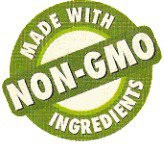
“gmo” by DeCora, flickr (CC BY 2.0)
So it’s fairly evident that purchasing fair trade coffee brands is the way to go.
Like any great idea, fair trade has its critics. According to Peter Giuliano, fair trade is a great idea, but the actual certification falls flat.
It may be time to take this fair trade idea more seriously and regulate the certification process more stringently.
In the meantime, fair trade is a step in the right direction for both eco and social conscious decisions.
Do You Want the BEST Fair Trace Coffee Brand?
Hopefully, moving in the direction where nobody ever has to ask What Are Fair Trade Products anymore? And, what are the Best Fair Trade Coffee Brands?
Sorry, the comment form is closed at this time.